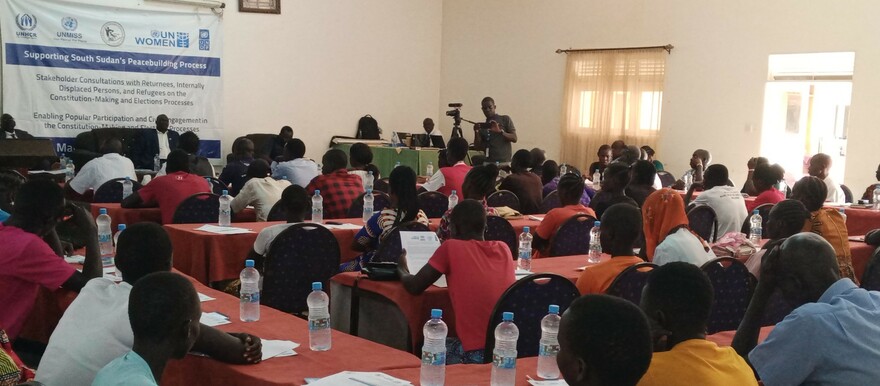Returnees and Internally Displaced Persons (IDPs) in South Sudan’s Eastern Equatoria State have set preconditions for their participation in general elections in December 2024. They have asked their government to embark on extensive repatriation as well as integration programs for all those who fled the country because of conflicts in 2013 and 2016.
Returnees and IDP representatives expressed these views during a two-day consultation workshop on the constitution-making process and upcoming elections. The workshop started on Wednesday in Torit town of Eastern Equatoria State.
United Nations agencies, including United Nations Mission in South Sudan (UNMISS), United Nations High Commission for Refugees (UNHCR), United Nations Women, United Nations Development Program (UNDP) and the state Relief and Rehabilitation Commission (RRC) office have come together fund and encourage the participation of the most affected populations to have a say in the constitution.
Officials at the workshop have said that the current constitution was rushed and that no adequate consultation was conducted. These officials have identified this factor as the cause of the crises facing South Sudan.
Eastern Equatoria State government has confirmed that more than 117,000 returnees have been registered in all 8 counties and that more are returnees on the way back to South Sudan. The state government has said more South Sudanese who fled are returning because there are reports of cuts in food rations in the four biggest refugee camps in northern Uganda.
“Another thing to consider as returnees before elections is integration. We are coming back from Uganda and Kenya, and it will be very important to integrate with the host communities from where they were displaced. Someone cannot come from Uganda before reaching home and end somewhere without voting. People need to be reached where they inhabited before being displaced to be integrated together,” Ohide Gabriel, one of the returnees, said.
Abonga Justine Francis, one of the returnees, has demanded that government first ensure there is peace and security in the country before talking about any elections.
“We should be well secured. There should be security for the IDPs. Last week some peacemakers were killed in Lafon, so what is that? There should be security so that the IDPs and returnees will participate in elections. You find returnees from Bidi Bidi, Pagirinya, Bweyale want to come back to South Sudan but fear that they will be ambushed and killed and another thing is awareness on the election process,” Justine said.
Hellen Teteo has explained that the main issue for most returnees and IDPs is the question of their safety and how they can become part of society again. She has shared that there have been failures on the part of the government and development partners when returnees and IDPs returned to the country. She insisted that returnees expect basic services when they leave refugee camps in Uganda and return home.
Addressing the workshop participants, the state minister for Information and Communication, Pastor Patrick Oting Cyprian, who is also the government spokesperson, emphasized the importance of citizen participation in the constitution-making process and that citizen input is crucial in all amendments to the constitution.
“We need your participation. Our constitution was written in a rush when we wanted to become independent but everything is there. Now we want every person to be involved in amending that constitution and put in what was left out,” Minister Oting said.
Okuma Augustine, the chairperson of the Relief and Rehabilitation Commission, has said the constitution-making process requires enough time. He urged the peace partners to expedite the process of getting the input of citizens before elections are held in the next nineteen (19) months.
“The refugees and IDPs are very important in grassroots consultation. So leaving them out makes the constitution-making process undemocratic. They are to be involved in all processes, and their voices are their rights and duties in the constitution are paramount. During the struggle, we were fighting for a secular, united Sudan. We were not expecting to be independent, so little effort was put into the possibility of our independence. But now that we are independent, putting a good constitution is a core foundation,” Okuma said.
Head of UNMISS in Torit field office Caroline Waudo has said the United Nations is mandated to embark on consulting the population from all backgrounds to participate in how South Sudan is managed.
She said the participation of returnees and IDPs is a democratic right that the UN and government acknowledge as an opportunity for citizens to understand the peace agreement and road map to elections.
“For us as partners and the UN family, we have embarked on a journey to work with stakeholders to consult with refugees, returnees and IDPs to participate in the constitution-making process as well as the election process. They are very important members of a society who are sometimes disadvantaged by the fact that they are displaced from their original homes,” Waudo explained.
At present, South Sudan has 2.2 million internally displaced persons and 2.3 million are displaced in neighbouring countries as refugees.




